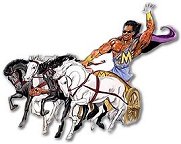|
PAGE ONE
His Birth: King
Aeson, who was Jason's father, was the rightful heir to a
kingdom in Greece called Iolcus. His step-brother Pelias took
advantage of Aeson's advancing age and stole the kingdom away
from him, locking up Aeson as a prisoner in the palace.
Polymele, Aeson's wife, became pregnant but she knew that the
coming child would be killed by his uncle Pelias, who had been
warned by an oracle to beware any descendents of Aeson. When the
baby arrived, she gathered her kinswomen and maids around her
and had them wail and weep as if the baby had been still-born.
Evil king Pelias thought the baby had died at birth, but
Polymele had baby Diomedes (later called Jason) smuggled out of
the city and delivered to Mount Pelion and to the care of
Cheiron.
Cheiron the Centaur, famous teacher of many a hero, was
entrusted with his upbringing, and a fine job he did! Young
Diomedes, the son of Aeson and Polymele, grew up to be a
peerless warrior, skilled in all the martial arts. Under the
expert tutelage of Cheiron, Diomedes learned archery, sword play
and horsemanship. But most of all, Diomedes mastered the art of
leadership.
When the time was right, Cheiron revealed to Diomedes his true
identity and instructed him that it was his birthright to claim
back the Iolcan throne from his uncle Pelias. Jason, as Diomedes
was now called, set out for Iolcus.
The Golden Fleece: Needless to say
Pelias wasn't too happy when Jason showed up and boldly claimed
his father's throne. He wanted to kill young Jason then and
there but he was restrained by the presence of Jason's other
uncles, who were thrilled to discover that Aeson had a son. So
Pelias devised a plan so dangerous that he was certain Jason
would never return alive - He told Jason that he would gladly
surrender the kingdom to Jason but not until the Golden
Fleece had been brought back to Greece from the
land of Colchis.
What was this Golden Fleece? Well, many years earlier a king
named Athamas had tired of his wife and taken a new one. Afraid
that the new Queen meant harm for her two children, ex-Queen
Nephele prayed for help. Hermes, the messenger god and
all-around good deity, promptly delivered a magical flying ram,
which had a fleece of gold. Hermes instructed Nephele to place
her children, a boy named Phrixus and a girl called Helle, on
the ram so that they could be carried to safety.
Sadly, Helle got careless while crossing the straits which
separate Europe and Asia and fell into the waters below,
drowning. The waters henceforth were called the Hellespont in
her honor. Phrixus was devastated by the loss of his sister but
he arrived safely to Colchis, where he was hospitably received
by King Aetes.
Phrixus proceeded to sacrifice the ram to the King of the
Olympians, Zeus, who had safely delivered him from harm, and he
presented its golden fleece to King Aetes. The king dedicated
the fleece to the god of war Ares and placed it in a consecrated
grove, under the care of a dragon that never slept.
The Argonauts: Jason sent heralds
all across Greece, seeking brave volunteers who would join him
in this great adventure. Every royal house in Greece wanted to
send a representative on the Quest for the Golden Fleece and
Jason had no problem amassing a Who's Who of warriors. The
master ship-builder Argo constructed a fifty-oared ship, the
largest ever built at the time, and the great goddess Athena
herself helped Argo choose the finest lumber from the trees of
Mount Pelion.
When the ship was ready Athena named it the Argo, in honor of
its builder, and named its crew the Argonauts, without argument
the greatest collection of heroes ever assembled. They included
the amazing Heracles (Hercules), the incomparable poet Orpheus
and the virgin huntress Atalanta, who had also taken part in the
famous Calydonian Boar hunt.
Various sources cite different participants on the Quest, but
this is the generally accepted list:
Acastus, son of King Pelias
Actor, son of Deion the Phocian
Admetus, prince of Pherae
Amphiaraus, the Argive seer
Great Ancaeus of Tegea, son of Poseidon
Little Ancaeus, the Lelegian of Samos
Argus the Thespian, builder of the Argo
Ascalaphus the Orchomenan, son of Ares
Asterius, son of Cometes, a Pelopian
Atalanta of Calydon, the virgin huntress
Augeias, son of King Phorbas of Ellis
Butes of Athens, the bee-master
Caeneus the Lapith, who had once been a woman
Calais, the winged son of Boreas
Canthus the Euboean
Castor, the Spartan wrestler, one of the Dioscuri
Cepheus, son of Aleus the Arcadian
Coronus the Lapith, of Gyrton in Thessaly
Echion, son of Hermes
Erginus of Miletus
Euphemus of Taenarum, the swimmer
Euryalus, son of Mecisteus, one of the Epigoni
Eurydamas the Dolopian, from Lake Xynias
Heracles of Tiryns, son of Zeus
Hylas the Dryopian, squire to Heracles
Idas, son of Aphareus of Messene
Idmon the Argive, Apollo's son
Iphicles, son of Thestius the Aetolian
Iphitus, brother of King Eurystheus
Jason, captain
Laertes, son of Acrisius the Argive
Lynceus, the look-out man, brother to Idas
Melampus of Pylus, son of Poseidon
Meleager of Calydon
Mopsus the Lapith
Nauplius the Argive, navigator, son of Poseidon
Oileus the Locrian, father of Ajax
Orpheus, the Thracian poet and musician
Palaemon, son of Hephaestus
Peleus the Myrmidon
Peneleos, son of Hippalcimus
Periclymenus of Pylus, the shape-shifting son of Poseidon
Phalerus, the Athenian archer
Phanus, the Cretan son of Dionysus
Poeas, son of Thaumacus
Polydeuces, the Spartan boxer, one of the Dioscuri
Polyphemus, son of Elatus, the Arcadian
Staphylus, brother of Phanus
Tiphys, the helmsman
Zetes, brother of Calais
Before they departed Athena affixed an oracular branch on the
prow of the Argo, cut from Zeus' sacred oak at Dodona. The
branch spoke with a human voice and it foretold the future. It
was too cool. Nice gift, Athena!
JASON & THE
ARGONAUTS PAGE TWO!

JASON & THE
ARGONAUTS PAGE TWO!

BACK HOME

|







